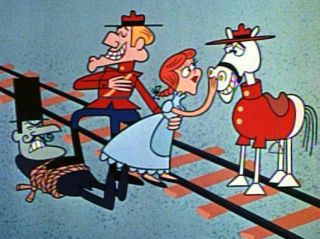Politics and Social Status
People’s politics are partly driven by a desire for status.
People tend to express political views that will win the approval of their peers. They tend to remain silent if they hold opinions that would be criticized by their peers.
These belief systems become self-reinforcing in each subgroup of society. Churchgoers tend to adopt the beliefs of their congregation. Hollywood actors tend to adopt the beliefs of Hollywood. Police tend to share political views with other police. And so on.
Each person is connected to members of many different peer groups, but people tend to adopt the views of the groups with which they are most connected.
Righteous Outrage
The self-reinforcing nature of political beliefs is driven largely by fear. People fear being shamed for holding the wrong beliefs.
But why are people so afraid? Don’t educated societies respect differences of opinions? Don’t people know that someone can be wrong without being bad?
Perhaps in the beginning they do. But as the the boundaries between correct and taboo beliefs begin to crystallize, a certain force begins to flow within a group: righteous outrage.
Eventually, the group becomes so convinced of the righteousness of their beliefs, that certain members feel safe in expressing outrage against those who express the wrong beliefs.
Next, people begin to fear this outrage, and the shame of being its target.
So people that disagree learn to be silent, or to express outrage to better blend in. This results in a feedback loop (the Spiral of Silence or Preference Falsification), with dissenting voices becoming increasingly silent as those most interested in status and power express their righteous outrage the loudest.
Victims, Villains, Heroes
There are three main rungs on the societal ladder:
- Hero
- Victim
- Villain
The hero expresses righteous outrage against villains on behalf of victims. The hero is outraged against the baby killers. The hero is outraged against a system rigged against the poor. The hero is outraged against terrorists and racists.
One Man’s Hero…
But most political issues can be framed in ways that swap the role of hero and villain.
The villain killing babies is also the hero defending women’s rights. The villain dishonoring the flag is also the hero fighting for equality. The villain oppressing Muslims is also the hero defending the nation against Islamic terrorism. It’s an easy game to play.
The hero gains status and political power within his or her group by expressing the most righteous outrage against villains and the greatest sympathy with victims. So heroes put a great deal of political energy into making people into villains and victims – as defined by their group – and expanding the definition of victim and villain as much as possible (e.g. microagressions).
However, in doing this, heroes open themselves up to becoming villainized in return by the heroes of other groups.
Ironically, the best people are often villains. They don’t accept all the beliefs of their social group, and they are unwilling to pretend they do. They have the courage to stand up to the righteously-outraged, and often are disgraced, imprisoned, or killed for that courage.
But the villains are often the heroes of the next generation. Progress requires villains, because without a villain willing to tell us we are wrong, we will never change.
Outrage is a Weapon
The left and right are in a perpetual war, where one of the main weapons is outrage. When deployed in concentration, political opinion-makers can create a veritable firestorm of outrage. Social media acts as a kind of accelerant, and the people are the fuel: by allowing themselves to be consumed, they keep the outrage raging.
By expressing your outrage, by canceling and shaming good people with wrong opinions, you are contributing to your side in this culture war. If you are on the right side, this may be a good thing. But you are also contributing a dynamic where your side can’t learn and evolve because it brooks no dissent, where outrage and shame have more power than empathy and reason. I would ask you to reconsider your weapons.
